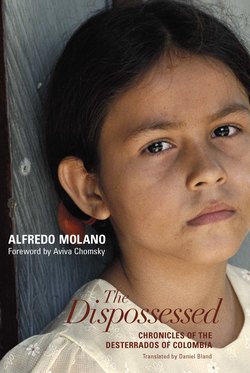Читать книгу The Dispossessed - Aviva Chomsky - Страница 10
На сайте Литреса книга снята с продажи.
ОглавлениеForeword
By Aviva Chomsky
Most people in the United States know something about Colombia. It’s difficult to live in this country and not absorb the idea that Colombia is a dangerous, violent place: a place full of guerrillas, cocaine, and drug traffickers.
Few people in the United States know that Colom bia is the third-largest recipient of U.S. military aid in the world; that more journalists, teachers, and trade unionists are killed every year in Colombia than anywhere else in the world; and that the perpetrators of the violence in Colombia are, overwhelmingly, the very military that the United States trains and supplies—together with its paramilitary allies. Few know that the victims of the violence are, overwhelmingly, unarmed civilians, peasants, and workers, men, women, and children, whose crime is that their very presence stands in the way of the profits of the powerful.
Few people in the United States are aware of the global links in Colombia’s violence, yet these global links are many. Colombia’s coffee, oil, gold, bananas, flowers, emeralds, and coal, as well as Colombian cocaine, flow into world markets. Foreign companies such as Coca-Cola, Chiquita, Dole, Standard Oil, Occidental Petroleum, Exxon, Nestlé, Drummond, BHP Billiton, Glencore, Anglo American, and GreyStar control important sectors of Colombia’s economy and reap important profits from their Colombian operations. International lending agencies such as the World Bank and the International Monetary Fund have pressed privatization on Colombia, meaning that the ability of the government to make decisions about the country’s resources and economy continues to shrink.
How can these companies maintain their profits when peasants live on the land the companies want to mine, when workers organize for decent wages and benefits, when citizens demand a voice in the use of their country’s resources? To answer this question is to uncover the sources of violence that are hidden to much of the U.S. public. Money flows from U.S. taxpayers to the U.S. government, to the Colombian military, to the paramilitaries; the latter two use these funds explicitly to remove any obstacles to the profits of foreign companies. Paramilitary incursions clear peasants from valuable land, such as the gold-rich areas of the Sur de Bolívar or Norte de Santander, opening it to foreign investors. Para military forces patrol companies’ premises, enter factories, and selectively kill workers who organize unions, as they have been accused of doing in the La Loma coal mine (owned by the Alabama-based Drummond Company), or Coca-Cola bottling plants, or Urabá’s banana plantations. Colombian army units are specially trained to guard U.S.-owned facilities like Occidental Petroleum’s Caño Limón-Coveñas oil pipeline.1
For the past twenty years, Colombian sociologist and journalist Alfredo Molano has worked to reveal the social and cultural effects of the violence in Colombia. As a teacher and scholar, as a journalist and author, and as a tire less advocate for human rights, Molano’s name stands out in Colombian and international circles. Until now, however, the English speaking public has had little access to his work.
Alfredo Molano’s The Dispossessed brings us the voices of Colombians displaced by violence. These are intensely personal stories, yet they are also more than just individual stories. This volume contributes to the genre of testimonio, or testimony, a distinctively Latin American literary movement that flourished in the 1980s. The roots of Latin American testimonio date all the way back to the sixteenth-century Dominican friar Bartolomé de las Casas who, outraged by the violence unleashed by Spanish conquerors on the indigenous population of the so-called Indies, devoted his life to un earthing and recording the voices that the conquerors tried to silence. Testimonio is generally a personal story recorded by an outsider for a political purpose, to bring the voice of the voiceless to a larger public, to awaken the consciousness of the world to the violence, to try to stop it. Many of the testimonios of the 1980s came out of Central America, and they played an important role in awakening public awareness of, and solidarity with, Central American social movements.2
The people whose stories Molano tells are not social activists. They do not provide political or structural explanations of their lives; they do not tell stories of coming to consciousness. Yet together their stories add up to a powerful analysis of today’s Colombia, and should indeed in spire readers to challenge the U.S. policies that continue to kill, impoverish, and displace the people of Colombia.
1 Human Rights Watch, Colombia’s Killer Networks: The Military-Paramilitary Partnership and the United States (New York: Human Rights Watch, 1996); Michael McClintock, Instruments of Statecraft: U.S. Guerrilla Warfare, Counter insurgency, and Counterterrorism, 1940–1990 (New York: Pantheon Books, 1992); David Bacon, “The Colombian Connection: U.S. Aid Fuels Dirty War Against Unions,” In These Times, July 23, 2001; Aram Roston, “It’s the Real Thing: Murder,” The Nation, September 3, 2001.
2 Elisabeth Burgos-Debray, I, Rigoberta Menchu (New York: Verso Books, 1987); Domitila Barrios de Chungara, Let Me Speak! Testimony of Domitila, a Woman of the Bolivian Mines (New York: Monthly Review Press, 1979); Lynn Stephen, Hear My Testimony: María Teresa Tula, Human Rights Activist of El Salvador (Boston: South End Press, 1994); Elvia Alvarado, Don’t be Afraid, Gringo: A Honduran Woman Speaks from the Heart (New York: Perennial, 1989); Thomas F. Reed and Karen Brandow, The Sky Never Changes: Testimonies from the Guatemalan Labor Movement (Ithaca, NY: ILR Press, 1996).
